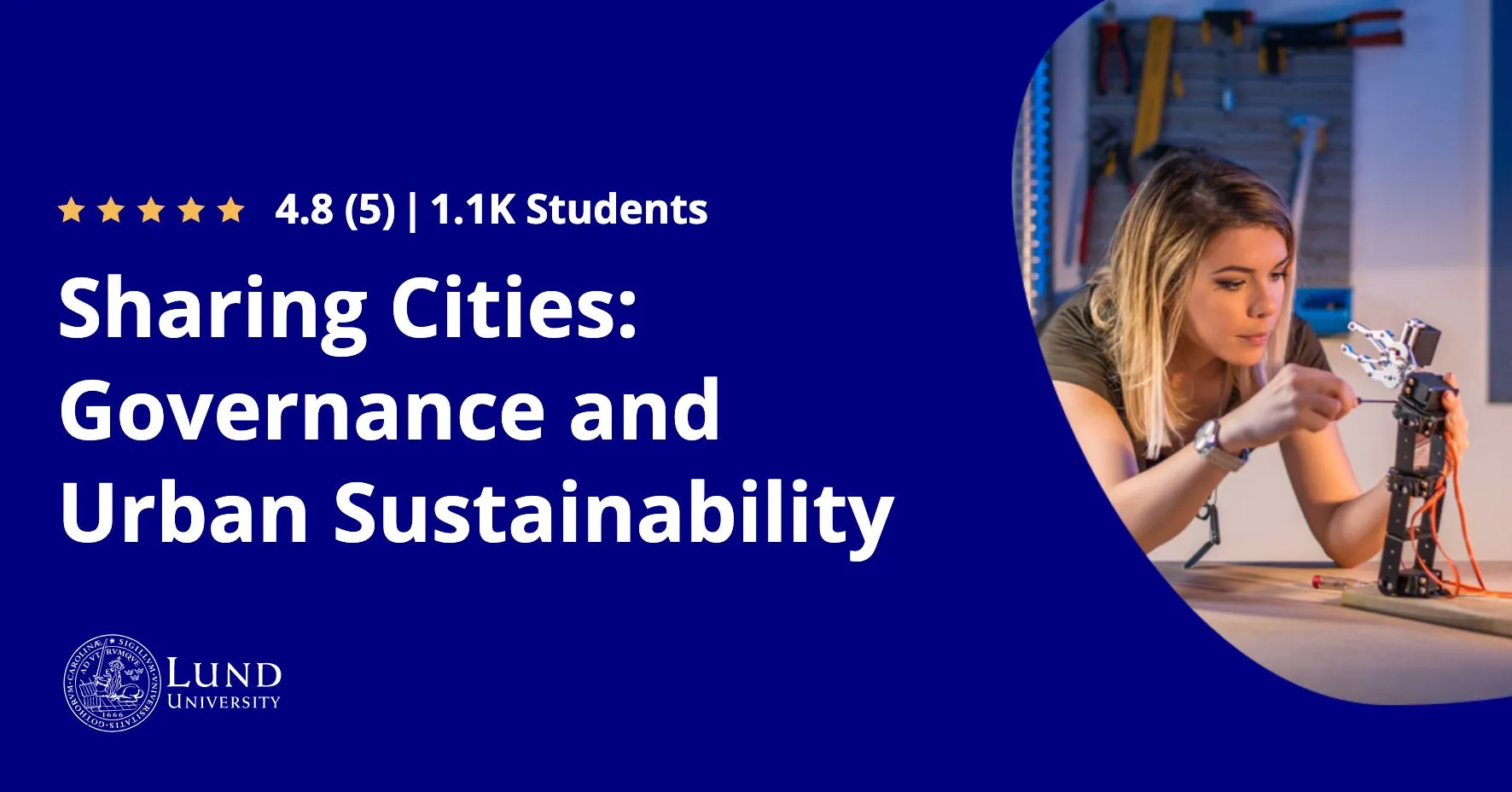
Sharing Cities: Governance and Urban Sustainability 
This course explores the relationship between the sharing economy, cities, governance, and urban sustainability, offering a comprehensive understanding of the concept of "sharing cities". It provides unique insights into the potential of this model to promote sustainability in urban areas. ▼
ADVERTISEMENT
Course Feature
![]() Cost:
Cost:
Free
![]() Provider:
Provider:
Coursera
![]() Certificate:
Certificate:
No Information
![]() Language:
Language:
English
![]() Start Date:
Start Date:
Self Paced
Course Overview
❗The content presented here is sourced directly from Coursera platform. For comprehensive course details, including enrollment information, simply click on the 'Go to class' link on our website.
Updated in [March 06th, 2023]
This course, Sharing Cities: Governance and Urban Sustainability, provides an overview of the sharing economy in cities. It begins with a presentation by Kes McCormick on the Sharing Cities Sweden program, a national program for the sharing economy in cities. Yuliya Voytenko then provides an introduction to the role of municipalities in sharing cities, followed by a discussion on regulating the sharing economy. Finally, Harmen van Sprang presents on the concept of sharing cities, and the idea of “sharing is the new owning”.
[Applications]
After this course, participants are encouraged to apply the knowledge gained to their own cities. They can use the information to develop strategies for urban sustainability and governance, as well as to create policies that promote the sharing economy. Additionally, they can use the course material to create initiatives that foster collaboration between municipalities and the sharing economy. Finally, they can use the course material to create awareness and education campaigns that promote the sharing economy and its benefits.
[Career Paths]
1. Urban Planner: Urban planners are responsible for developing plans and strategies for the sustainable development of cities. They work with local governments, businesses, and community organizations to create plans that promote economic growth, environmental sustainability, and social equity. They also work to ensure that the plans are implemented in a timely and cost-effective manner. Urban planners are in high demand as cities around the world are increasingly looking to create more sustainable and livable environments.
2. Smart City Manager: Smart city managers are responsible for developing and implementing strategies to make cities more efficient and sustainable. They work with local governments, businesses, and community organizations to create plans that promote the use of technology to improve the quality of life in cities. They also work to ensure that the plans are implemented in a timely and cost-effective manner. Smart city managers are in high demand as cities around the world are increasingly looking to create more efficient and livable environments.
3. Sharing Economy Consultant: Sharing economy consultants are responsible for helping businesses and organizations understand and capitalize on the opportunities presented by the sharing economy. They work with businesses to develop strategies to maximize the potential of the sharing economy and to ensure that the plans are implemented in a timely and cost-effective manner. Sharing economy consultants are in high demand as businesses around the world are increasingly looking to capitalize on the opportunities presented by the sharing economy.
4. Sustainable Transportation Planner: Sustainable transportation planners are responsible for developing plans and strategies for the sustainable development of transportation systems. They work with local governments, businesses, and community organizations to create plans that promote the use of sustainable transportation systems. They also work to ensure that the plans are implemented in a timely and cost-effective manner. Sustainable transportation planners are in high demand as cities around the world are increasingly looking to create more efficient and livable transportation systems.
[Education Paths]
1. Urban Planning: Urban planning is a field of study that focuses on the development of cities and towns. It involves the analysis of land use, transportation, infrastructure, and other factors that affect the quality of life in urban areas. Urban planners work to create sustainable and equitable cities that are livable and attractive to residents. Developing trends in urban planning include the use of data-driven decision-making, the integration of green infrastructure, and the promotion of social equity.
2. Sustainable Development: Sustainable development is a field of study that focuses on the economic, social, and environmental aspects of development. It seeks to create a balance between economic growth and environmental protection. Developing trends in sustainable development include the use of renewable energy sources, the promotion of green building practices, and the adoption of sustainable consumption and production patterns.
3. Environmental Science: Environmental science is a field of study that focuses on the study of the environment and its interactions with humans. It involves the analysis of natural resources, pollution, climate change, and other environmental issues. Developing trends in environmental science include the use of technology to monitor and manage environmental resources, the development of green technologies, and the promotion of sustainable practices.
4. Public Policy: Public policy is a field of study that focuses on the development and implementation of policies that affect the public. It involves the analysis of government policies, regulations, and laws. Developing trends in public policy include the use of data-driven decision-making, the promotion of social equity, and the integration of environmental considerations into policymaking.
Course Syllabus
The Role of Municipalities in Sharing Cities –Self-governing (Yuliya Voytenko)
Test-bed Stockholm (Örjan Svane)
Sharing Practices - The Smart Map
Sharing is the new owning – part 2
Course Provider

Provider Coursera's Stats at AZClass
Sharing Cities: Governance and Urban Sustainability explores the relationship between the sharing economy, cities, governance and urban sustainability, and provides a comprehensive understanding of the concept of "sharing cities". It provides unique insights into the potential of this model in promoting sustainable development in urban areas. Learners can explore the exciting world of shared cities and the urban sharing economy by taking this online course. They can learn about national plans for the sharing economy in cities, the role of municipalities in sharing cities and the concept of sharing as the new ownership.
Discussion and Reviews
0.0 (Based on 0 reviews)
Explore Similar Online Courses

Population Health: Study Design

Intelligent Machining

Python for Informatics: Exploring Information

Social Network Analysis

Introduction to Systematic Review and Meta-Analysis

The Analytics Edge

DCO042 - Python For Informatics

Causal Diagrams: Draw Your Assumptions Before Your Conclusions

Whole genome sequencing of bacterial genomes - tools and applications

Advanced Erosion Control Measures

Environmental Studies


Start your review of Sharing Cities: Governance and Urban Sustainability